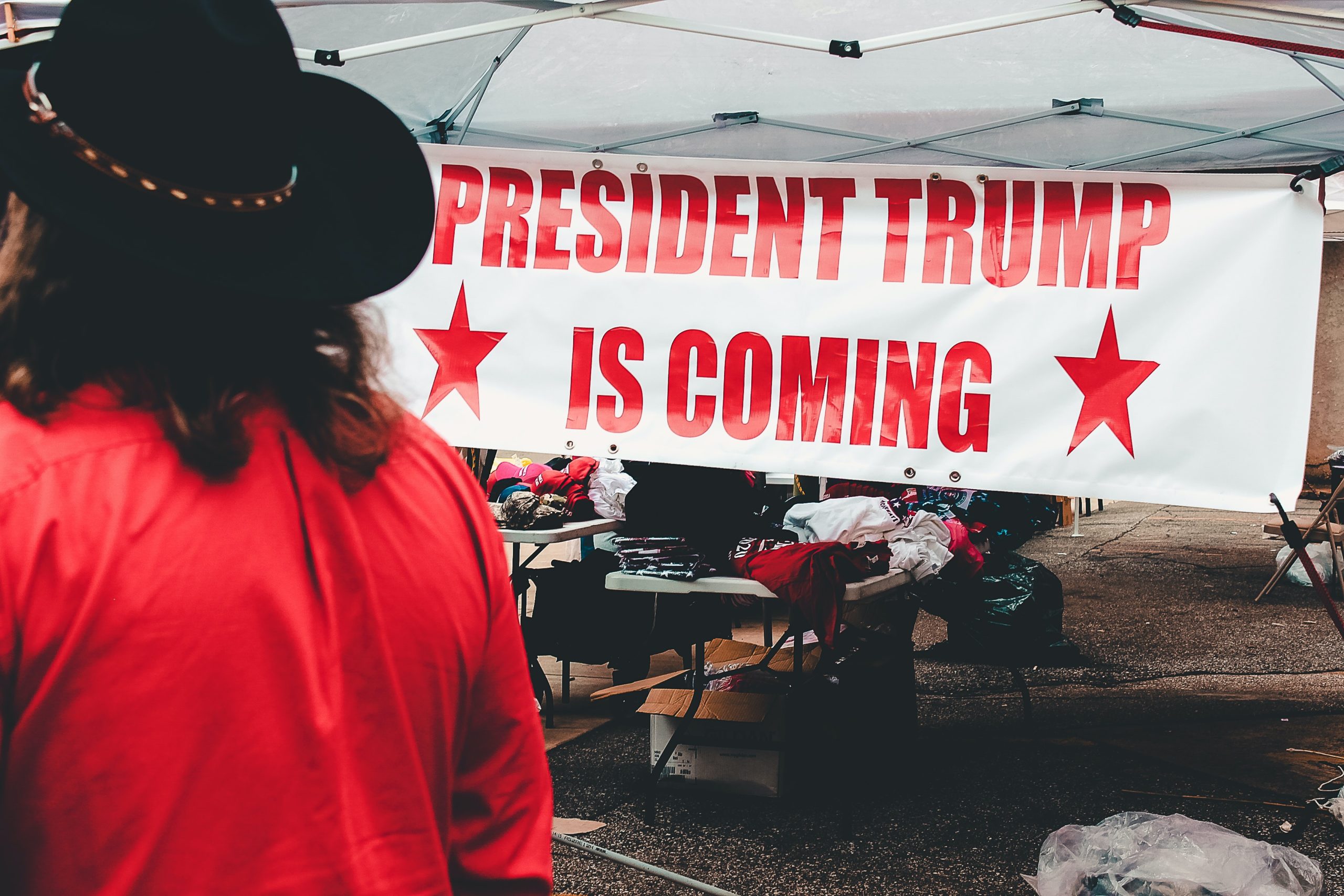
A Native of Conklin, NY Discusses QAnon
Sarah Louise MacMillen
Picture by Rosemary Ketchum on Pexels.
The author wishes to thank Timothy Rush and George Lundskow for their helpful input related to this essay.
In a series of recent articles in the journal Critical Sociology my colleagues and I explored the hazards of conspiracy theories within contemporary media spaces and political culture. While conspiracy theories aren’t new to politics or religion, the fascistic presence emerging within American political culture and civil society is characterized by certain conspiratorial modes of expression. These should not be ignored. This essay for Canopy seeks to discuss this phenomenon through the work of the sociologist and theologian Jacques Ellul’s mid-twentieth century exploration of the roots of fascism. The pro-Trump QAnon movement is, as the New York Times defined it in September of 2021, a “big tent” conspiracy theory, arising from an Internet-base that projects a number of political scenarios. The main scenario is that the presidential election of 2020 was manipulated by an elite cabal of liberal pedophiles, whom Donald Trump is righteously battling. Why is QAnon significant? Why do some not see it as lies and nonsense? It is based on untruths, yes and for that fact alone, QAnon jeopardizes American political culture. But it is also derived from powerful forms of pseudo-Biblical imagery, and other dynamics within American political and religious cultures: this is what makes it so potent and persuasive.
The work of mid-20th century French thinker Jacques Ellul resonates with American politics today. Ellul was able to see the unique nexus between law, politics, and religion wherein certain forms of fascism coalesce without the usual “checks-and-balances” that liberalism provides. In an edited volume on Ellul’s thought, Ellul scholar Jacob Rollison summarizes that for Ellul, fascism emerges when “law is no longer at the heart of society.” What is then left to connect the personal to the collective? “Technique (the obsession with efficiency, and technology as a means to salvation) and propaganda then become the very means of government.” However, even more significantly, Ellul anticipated how Western liberalism actually creates an opportunity for fascism to thrive symbiotically, as a reaction to the tenets of liberalism. Though he was inspired by Marxist perspectives on mass movements, Ellul was sensitive to the ways the “masses” could be manipulated by propaganda. Further, Rollison explores how in his essay “Fascism, Son of Liberalism” (1937), Ellul describes fascism as a “feigned” reaction against this world. Ellul notes that the strong emotional seductiveness of fascism is both a product of a) liberalism and b) sociologist Émile Durkheim’s sense of modern forms of solidarity, even as it presents itself as a rejection of that very solidarity. The ultimate draw of fascism is its revisionist nostalgic form of what Durkheim attributed to primitive religious cultures, also known as “mechanical solidarity.” Mechanical solidarity is derived from the sharing of values, norms and beliefs, similarities in identities, and is usually based in religious or magical values of ritual, symbol, and tradition. In contrast, modern society is based on our sense of “interdependence” within working and social (usually urbanized) life. Fascism then requires a “magician,” rather than a politician. It is animated by spectacle and carnival. It is an energy that can charismatically draw out the support of the alienated masses.
Today — in the mid-stage between liberalism and fascism — the collective political will remains the creator of law based upon the legacy of laws, and all the old liberal theories can reappear in a kind of carapace. Ellul notes that “the judicial transformation of fascism…may make mass special laws against Jews and others, claiming that it is based on morality peculiar to its people. Ultimately fascist laws change nothing.” In “Fascism: Son of Liberalism,” Ellul stresses that the important dynamic of fascism is in its social forms and challenge to the political establishment. For QAnon this challenge takes the form of a discourse where civil society and populist politicians on the far right use imagery and figurative expressions found on political signage and bumper stickers (like “drain the swamp,” “no more bullshit,” and even “liberalism is the new fascism”) to contrast with the rhetoric of the so-called “political elites.” Also, one must note the most recent dog-whistling politics moments from Ted Cruz, Josh Hawley, and others during the Ketanji Brown Jackson confirmation hearings. Here, the “coded” message was a subtle, or not so subtle nod to QAnon assumptions about the perverse tendencies of the “liberal elite”: Many of the inquiries and questions directed at Judge Brown Jackson focused on the “liberal” nominee’s judgments on cases related to sex offenders and child pornography. One dimension of building fascist energy is an obsession with the battle of purity versus perversion. There is a link here between “liberalism” and perversion that recalls the embrace of traditional values in fascist Germany as a reaction to a “libertine Weimar” in troubling ways.
There are other troubling aspects of QAnon that build from these self-perceived “traditionalist” values. QAnon’s voice erupts from within an aggrieved pocket of civil society and is a symptom of what Richard Hofstadter noted generations ago in Anti-Intellectualism in American Life. When anti-intellectualism meets religion there is a perfect storm of emotivism with the power of transcendent claims. As Michael Luo suggests, following historian Mark Noll, there is “no mind,” or tempered dialogue between faith and reason, within many pockets of American Evangelicalism today. As Katelyn Beaty of Religion News Service noted early in the emergence of QAnon, Evangelicals are particularly vulnerable to QAnon. Perhaps this is due to Evangelicals’ mode of polity/authority being generally located in the individual believer. It is no mere coincidence that COVID surges and support for QAnon overlapped. During the isolation of quarantine, QAnon was able to take hold as a kind of Internet religion. There is an important point here about clerical authority and theological knowledge. Though the abuses of power by many religious authorities is clear today (as in the case of the Roman Catholic Church’s Sex Abuse scandals and cover-ups), in some cases, there are benefits to granting authority to educated clergy or theologians. When the search for knowledge and authority is left to the individual (and their mobile phone search) there is no gatekeeper for theological knowledge, and it is more difficult to distinguish between legitimate and illegitimate interpretations of scripture. This lack of gatekeepers, combined with a perceived grievance about secularization and diversity, creates a “perfect” storm for the anti-intellectual forces of QAnon. The grievance is further illuminated by Ellul and Wilhelm Reich in the context of the events leading up to World War II. Again, as in Weimar Germany, we see here a rejection of elite liberal and secularized knowledge, also encompassing cultures of diversity, individualism and tolerance. These are typically the values of what late 19th/early 20th century social thinker Ferdinand Tönnies describes in his concept of Gesellschaft.
Where liberal “faith” proclaims a need for reason, QAnon embraces the irrational, mythical mode of political and social expression within civil society in contrast to the value of science and reasonable democratic processes.
Additionally, Theodor Adorno’s description of the American religious imagination’s rejection of the intellectual and Pharisaical also relates to QAnon’s discussion of the sinful “troupe”/liberal cabal of elites. There is a long legacy of antisemitism in various forms that lead up to the contemporary category conspiracy theorizing presented by QAnon. In response to Adolf Hitler’s ascent, Wilhelm Reich, accurately noted that the contemptuous label of “Jew” was applied to anyone who did not fit the Aryan mold. Of course, the labeling of “bicoastal secular education-and-media elite” is the current confabulation and constellation of “Jew” identity today. As Reich described, the “little man,” who lacks the powers of creativity and the energy to truly self-govern (issues compounded by the force of overwhelming social, political, economic, environmental problems) cedes power to the “big man” savior in grandiose populists like Donald Trump. Donald Trump’s savior status is built upon the sense that something is deeply wrong with the status quo. As Lorenzo DiTomasso explains, this creates the apocalyptic setting “for a collective eschatological salvation that anticipates an earthly utopia as the abode and reward of the saved.” DiTomasso continues, “Messianism is the set of ideas concerning the anticipation for an end-time agent(s) who play a positive, authoritative, and usually redemptive role.” The ressentiment is fueled by the “Great Replacement” theory as a motivator for QAnon followers, as Chicago researcher on terrorism, Robert Pape has demonstrated in his analysis of the January 6, 2021 participants. QAnon conspiracies are followed by a population that are fueled by ressentiment: usually the less educated, but sometimes financially well-off middle class, as described by my colleagues Lauren Langman and George Lundskow. Finding a similar connection between QAnon support and ressentiment, Anthony DiMaggio suggests the narrative that Trump voters are on the social margins and experience low income is largely a constructed one. DiMaggio states, “The vast majority of Trumpeters…see the rich as virtuous, as deserving of their wealth, and as having ‘worked harder’ than the rest of us to obtain their wealth….Trump’s support base is very much grounded in the traditional right wing neoliberal and plutocratic values of the GOP.” The ressentiment reflects a constructed myth about “what is wrong with the status quo,” and the deliverer, of course, is the Messianic presence of Donald Trump.
The power of the conspiracy narratives reinforces the fact that there is a strong influence of the mythical imagination as it looms large in the forms of religion meeting propaganda of today. Where liberal “faith” proclaims a need for reason, QAnon embraces the irrational, mythical mode of political and social expression within civil society in contrast to the value of science and reasonable democratic processes. The iconic image of the caricatured-Shaman in buffalo skins/headdress is the perfect symbol of the uniquely American animal, and the mythical imagination. In a Jungian psychological trope, here is a dynamic anima (using Native American imagery) to the animus of American liberalism and a sense of “fallen” reason–via white liberal elites from the Ivy League. This character is a fascinating example of the charismatic interruption through the means of a kind of a “noble savagery” in the QAnon movement — again, the corrupt, educated, polished, bi-coastal elites deserve a “rupture”; it is also an apocalyptic “awakening.” One can recall the co-opted and fetishized heroes of Native wisdom in the “Indians” of old Westerns.

“Q” is known for its coded “drops” of scripture. Hosea 4 appears on a billboard in the Bible belt/Trump country of Central Pennsylvania: a potential QAnon “drop.” In this Hebrew Prophet, there is an outline of the destiny of the Children of Israel (applied to today…America led to sin and unholy behaviors). Hosea 4: 1-2 reads, “Hear the word of the Lord, ye children of Israel: for the Lord hath a controversy with the inhabitants of the land, because there is no truth, nor mercy, nor knowledge of God in the land. By swearing, and lying, and killing, and stealing, and committing adultery, they break out, and blood toucheth blood.” Especially relevant to the QAnon audience, these behaviors are practiced by bicoastal elites who do not heed the Law of the Lord, especially in the entertainment, political and intellectual industries (swearing, lying, killing, stealing, adultery). There is also a threat of retributive violence embedded here.
In the next verse of the fourth chapter of Hosea comes the prophesied punishment and apocalyptic opening, perhaps reflecting our current discourse about ecological crises. Hosea 4: 3 reads, “Therefore shall the land mourn, and every one that dwelleth therein shall languish, with the beasts of the field, and with the fowls of heaven; yea, the fishes of the sea also shall be taken away.“ Later, in Hosea 4: 6: “My people are destroyed for lack of knowledge: because thou hast rejected knowledge, I will also reject thee, that thou shalt be no priest to me: seeing thou hast forgotten the law of thy God, I will also forget thy children.” The punishment here, coded in the idea that the people of Israel, the chosen ones, the holy ones, the United States (in all its self-gloried exceptionalism), have “forgotten God’s Law” and incurred divine punishment, legitimates the actions of January 6: “destroyed for lack of knowledge…thou hast rejected knowledge” and again the “elites” have “forgotten the law.” According to Ellul’s 1937 essay, within fascism, “law is no longer at the heart of society” but a mere façade. In the “old days” — even perhaps extended to a psychological projection and nostalgia-filtered “pre-fallen” biblical sense of “Israel” — law protected and connected the individual to society. Today, social media and toxic media mogul propaganda replace that important glue in civil society. As political sociologist Robert Putnam and others have explored, a decline in community connects to a decline in political culture as well. Civil and political society are diminished in a vacuum of life-sustaining forms of culture, replaced by horizontal (Facebook, Instagram, etc.) and vertical (media mogul) forms of propaganda. This is what Jacques Ellul so eerily predicted in the mid-20th century. ♦

Sarah Louise MacMillen (Ph.D., University of Notre Dame) is an associate professor of Sociology at Duquesne University in Pittsburgh, Pennsylvania. She is also the director of the Peace, Justice and Conflict Resolution Minor program within Duquesne’s McAnulty College of Liberal Arts. She researches and teaches in social theory, religion, peace studies and gender.
Recommended Citation
MacMillen, Sarah Louise. “A Native of Conklin, NY Discusses QAnon.” Canopy Forum, May 23, 2022. https://canopyforum.org/2022/05/23/a-native-of-conklin-ny-discusses-qanon/


